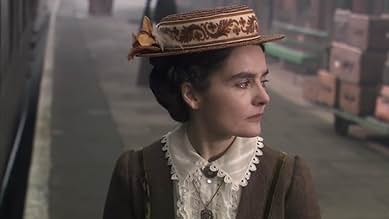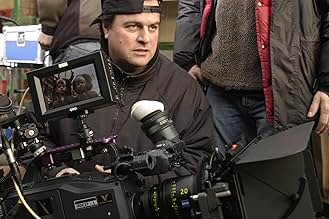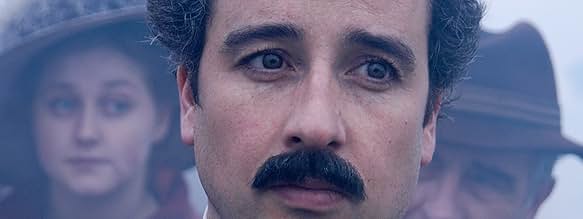Ajouter une intrigue dans votre langueThis docudrama examines the history of scientific discovery that lead up to Albert Einstein's famous equation E=mc2 and its aftermath in the creation of nuclear energy. This includes Faraday... Tout lireThis docudrama examines the history of scientific discovery that lead up to Albert Einstein's famous equation E=mc2 and its aftermath in the creation of nuclear energy. This includes Faraday's discovery of electromagnetic fields; Antoine Lavoisier's discovery that mass is never l... Tout lireThis docudrama examines the history of scientific discovery that lead up to Albert Einstein's famous equation E=mc2 and its aftermath in the creation of nuclear energy. This includes Faraday's discovery of electromagnetic fields; Antoine Lavoisier's discovery that mass is never lost; and Emilie du Chatelet's demonstration that Newton's calculation of the velocity of a... Tout lire
- Réalisation
- Scénario
- Casting principal
- Humphry Davy
- (as Sam West)
- Professeur Fritz Muhlberg
- (as Mike Sarne)
Avis à la une
As for the problem of rewriting history in order to assuage minorities, well, I understand Mr. Tarmcgator's taking issue in this case with the (possibly) fallacious reinvention of female scientists' roles in order to encourage young women of today to go into the sciences. I think we would be far better to discuss the possible reasons that young women are not going into or staying in the sciences as readily as men. This, however, is the one of the "giant" questions that we so far cannot answer - just seeing the reaction to Harvard president Lawrence H. Summers' speech last year (http://www.president.harvard.edu/speeches/2005/nber.html) is evidence of that (as an aside, I'm not about to say that he was horribly misguided in the questions he posed, which I think need badly to be discussed, but that perhaps - as has been widely suggested, in fact - he jumped to conclusions regarding the supposed greater weight of the role of genetics when comparing the sexes' abilities in mathematics).
No, I do not want to be lied to about women's roles in history (however dreary and depressing they usually turn out to be), but to quote you: "Emilie du Châtelet was no doubt a brilliant woman who tried to make the most of the limited intellectual opportunities that women could pursue in early 18th-century France; but one wonders how much more influential she was on the course of the development of physics than, say, Newton or Leibniz." One wonders indeed, sir; unfortunately, we will never know how great she would have been had she had the chance to attain the same education and encouragement as her male peers. All other things being equal, why couldn't she have been as great a mind as Newton or Liebniz? I, as a woman, was inspired by "E=mc²" to hope that she could have been. The authors seem to be attempting to give her this due, and perhaps in exaggerating the role that she did have, they are merely paying homage to the role she might have had, had she not been a prisoner to the time in which she lived. Can you honestly begrudge them this effort?
I have to agree with some other users when I acknowledge that the subject behind this docu-drama is fascinating but I must take issue with claims that this is a "great film" and all the "10 out of 10" votes that it has received on this site because the film itself is not worthy of the subject. It is hard not to be engaged by the basic history being delivered here, although it must be said that it is perhaps far too basic to be enjoyed by anyone who knows anything about the subject (which I pretty much don't). However it is the delivery that is the problem because this film is yet another in a recent spate of docu-dramas where dramatisations deliver history while experts contribute to flesh out the detail. Sadly, like other docu-dramas on channel 4 recently, the film relies too heavily on averagely acted dramatisations and not enough on the experts who are informed and passionate about the subject. The latter have just enough time to do the job (along with the narration) but the dramatisations are far too heavy and not helped at all by the score constantly pushing it to come across as more dramatic and exciting than it actually is. Often it seemed that the producers didn't totally trust the detail to be engaging enough.
Narrator Ecceleston veers between these two extremes. At times he provides solid narration but at others he tends towards hyping up the story for no real reason. The cast are reasonably mixed. Their performances are all good enough to act as a televisual live-exhibit (which is really what they are) but not good enough to do any more than this with a script that never required them to anyone. In fairness nobody is "bad" but it is hard to get past the fact that the narration and expert contributors are much more interesting and frustratingly given much less time to do their thing.
Overall then this is an OK film. It succeeds not on its own merits but on the value of the history and the people involved in developing the great ideas that we are swept through. Aiming for a wider audience is no bad thing but it is a shame that the film never lets the experts go into too much detail or to delve too deep, preferring instead to overdo the dramatisations. It will still be enough to engage some viewers but the lack of detail and the overdone re-enactments will put many off, as their main contribution is to distract rather than enrich.
I can imagine this film as an excellent introduction to modern physics and the history of science for middle school and high school students, as well as a basis for further reading by curious adults. I doubt that either Johnstone or Bodanis intended their work as an in-depth exploration of Einstein or his predecessors. This documentary shouldn't be held to that standard. It's for novices.
One quibble that probably will result in my hanging: The treatment of women in this documentary smacks of "women's studies" and the politically correct. Emilie du Châtelet was no doubt a brilliant woman who tried to make the most of the limited intellectual opportunities that women could pursue in early 18th-century France; but one wonders how much more influential she was on the course of the development of physics than, say, Newton or Leibniz. Marie-Anne Lavoisier was no doubt of great assistance to her husband, but his intellectual achievements in chemistry were essentially his own. Lise Meitner no doubt had to face a double whammy of being a woman in male-dominated academia as well as being Jewish in Hitler's Germany, and no doubt Otto Hahn didn't do enough after World War II to promote recognition of her achievements; but the depiction of their relationship in the film is, from what limited research I've done so far, open to dispute. (Yes, I need to do more research.) When Maleva Maric offers to check Einstein's math, I took it more as a wry commentary on her rather unimpressed attitude about being married to a genius, than any indication of an instrumental role in formulating Einstein's theories. No doubt (again!) he greatly benefited from her support, but does that make her a collaborator? With the exception of Meitner (who truly hasn't received enough credit for her work), the portrayals of the women in this film as somehow instrumental in the development of the ideas that would become the Theory of General Relativity and particle physics seem overstated, a sop to the current fashions of history and academia. The problem is not that there haven't been brilliant and talented women before the late 1900s; but that for all their brilliance and talent, the male-dominated cultures of their times prevented such women from having much opportunity to influence the development of science. Going back and recognizing them now is justice, but historians like Johnstone and Bodanis shouldn't overemphasize the significance of their work, as he does here, especially with Chatalet. Young women of today need all the encouragement they can get to go into intellectual and scientific occupations, but not at the price of distorting historical fact.
One other thing: I find the reference elsewhere among the other comments about this film having "more substance to ... someone from America" quite offensive. I'm sure everyone at the CERN (Western Europe's principal particle physics research facility) will be bored by this movie; of course, there were in 2003 more Americans working there than there were Europeans working at similar facilities in the United States. And of 129 Nobel physics laureates since World War II, only 55 percent were United States natives, or earned the prize for work done in the United States. Sorry, the United States has several things to answer for at present -- but a general slur on the intellect or education levels of U.S. residents is bigoted and inappropriate. This is not a film for physicists, but for those of us who would like to understand their passion for what they do.
ADDENDUM: Re: the comment by "mireillebelleau." I doubt that she and I have anything to disagree about, really. The point that I was trying to make (and may not have made clearly) is that in the context of THIS film -- which ostensibly deals with the development of Einstein's Theory of General Relativity and of modern physics generally -- the INFLUENCE of Emilie du Chatelet's work seems exaggerated. Emilie was undoubtedly a brilliant woman, and had she lived in a more enlightened Enlightenment, she would not have suffered the professional restrictions that her society imposed. But she did suffer those restrictions, and that meant that her accomplishments, however brilliant, were largely lost on the other scientists of her time. Later generations of scientists, in the late 18th,19th, and early 20th centuries, seem to have neglected her altogether -- until more recent scholars began making a conscious and conscientious effort to rediscover the work of Chatelet and women like her. Again, the issue is not the quality or originality of her work, but the impact she had on subsequent physicists, down to Einstein. I would argue that, in the context of this film, the case for her profound influence is not made.
What is it about? Well, it is not a biography of Einstein, as the title might make you think. It is a history of the idea of E=mc2 and where is came from. Einstein is just a cog in an angrenage of people that made it possible.
What is even better is that the science is made accessible and not just story told. It was a small revelation, but a revelation nonetheless, when the narrator asked "if you put pore energy into the movement of an object it moves faster, but it cannot move faster than the speed of light, no matter how much energy you put in. WHERE does the energy go?" and I finally understood why things have to get heavier as they reach the speed of light.
As for the role of women as brainy visionaries, why not? As long as the story is accurate, the empowerment of women as a byproduct is irrelevant.
Le saviez-vous
- AnecdotesThe movie was made to commemorate the 100th anniversary of the publication of Albert Einstein's paper in which he first outlined the theory of relativity.
- ConnexionsFeatures Aux origines de l'humanité: E=mc²: Einstein's Big Idea (2005)
Meilleurs choix
Détails
- Date de sortie
- Pays d’origine
- Sites officiels
- Langue
- Aussi connu sous le nom de
- Einstein's Big Idea
- Lieux de tournage
- Sociétés de production
- Voir plus de crédits d'entreprise sur IMDbPro
Contribuer à cette page




























